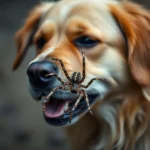
Introduction
Maintaining your dog’s health is crucial for their happiness and well-being. One common issue that many dog owners face is the unpleasant smell associated with their dog’s anal glands. This can be a source of embarrassment and concern, leading many to wonder how to get rid of dog anal gland smell. Understanding the role of anal glands, their proper care, and preventive measures can significantly improve your dog’s quality of life and mitigate any odor issues.
Understanding Dog Anal Glands
What are Dog Anal Glands?
Dog anal glands, also known as anal sacs, are small glands located on either side of your dog’s anus. They produce a strong-smelling fluid that dogs use for marking territory and communicating with other dogs. When a dog defecates, these glands typically express naturally, releasing their contents. However, some dogs may have issues that prevent this natural expression, leading to a buildup of the fluid.
Causes of Anal Gland Issues
Several factors can contribute to anal gland issues in dogs. A poor diet, particularly one low in fiber, can lead to soft stools that do not exert enough pressure to empty the glands. Obesity can also play a significant role, as it may make it harder for the glands to express naturally. Allergies and skin conditions may lead to inflammation around the glands, causing discomfort. Additionally, stress and anxiety can exacerbate these issues, leading to more frequent problems with anal gland expression.
Symptoms of Anal Gland Problems
Recognizing the symptoms of anal gland issues is important for timely intervention. Common signs include:
- Scooting: Your dog may drag their rear across the ground.
- Licking: Excessive licking of the anal area can indicate discomfort.
- Foul Smell: A noticeable odor may suggest that the glands need attention.
- Swelling or redness: This can indicate infection or inflammation.
If you notice these symptoms, it’s essential to consult your veterinarian to prevent further complications.
The Importance of Regular Anal Gland Care
Why Regular Care is Necessary
Regular care of your dog’s anal glands is vital for their overall health. Neglecting this aspect can lead to more severe conditions such as infections, abscesses, or impacted glands. By routinely monitoring and managing your dog’s anal gland health, you can help prevent these complications and maintain their comfort.
Frequency of Anal Gland Checks
The frequency of anal gland checks can vary based on your dog’s size, breed, and lifestyle. Generally, it is advisable to check your dog’s anal glands every few months. However, dogs prone to anal gland issues may require more frequent evaluations. Signs that indicate a need for professional evaluation include persistent scooting, foul odor, or visible swelling.
Home Remedies for Anal Gland Smell
Dietary Considerations
A balanced diet plays a crucial role in maintaining healthy anal glands. A diet rich in fiber can help promote regular bowel movements, which can naturally express the glands during defecation. Incorporating high-fiber foods such as pumpkin, sweet potatoes, and green beans can be beneficial. Additionally, supplements like probiotics can help improve gut health and reduce the likelihood of anal gland issues.
Home Expression Techniques
If you’re comfortable and your veterinarian approves, you can learn how to express your dog’s anal glands at home. Here’s a step-by-step guide:
- Gather materials: You’ll need gloves, a paper towel, and possibly a helper to hold your dog.
- Position your dog: Have your dog stand or lie down comfortably.
- Locate the glands: The anal glands are located at 4 o’clock and 8 o’clock positions around the anus.
- Apply gentle pressure: Use your thumb and index finger to apply gentle pressure towards the anus.
- Collect the fluid: Be prepared for a strong smell as you express the glands. Wipe away any fluid with the paper towel.
Safety Precautions: Always wash your hands thoroughly after the process and monitor your dog for signs of discomfort. If you’re unsure or uncomfortable, consult with a veterinarian.
Natural Remedies
Several natural remedies can help manage anal gland smell. For instance, pumpkin is a popular option due to its high fiber content, which aids in digestion. Probiotics can also help maintain gut health, potentially reducing anal gland issues. Additionally, some dog owners have found success using natural deodorizing sprays or wipes designed for pets, which can help mask unpleasant odors.
Professional Treatment Options
When to Consult a Veterinarian
If your dog’s symptoms persist or worsen despite home care, it’s crucial to consult a veterinarian. Signs that require veterinary intervention include:
- Persistent foul smell
- Swelling or redness around the anus
- Blood or unusual discharge
- Signs of pain or distress
Your veterinarian can perform a thorough examination and determine the best course of action.
Surgical Options
In severe cases where anal gland issues are chronic and non-responsive to other treatments, surgical options may be considered. Surgical removal of the anal glands can be effective, but it carries risks, including infection and complications from anesthesia. Discuss the potential benefits and risks with your veterinarian to make an informed decision.
Follow-Up Care
After any treatment, follow-up care is essential to monitor your dog’s recovery. Regular check-ups can help ensure that the issue does not recur, and your veterinarian can provide guidance on maintaining your dog’s anal gland health moving forward.
Preventive Measures for Anal Gland Health
Regular Grooming
Grooming plays a significant role in your dog’s overall health, including anal gland health. Regular brushing helps remove loose fur and debris, which can contribute to skin irritation. Additionally, professional grooming services often include anal gland checks, ensuring that potential issues are caught early.
Maintaining a Healthy Weight
Weight management is crucial for preventing anal gland issues. Obesity can lead to various health problems, including those affecting the anal glands. To help maintain a healthy weight, ensure that your dog receives a balanced diet and regular exercise. Monitor their food intake and make adjustments as needed based on their activity level.
Stress Management Techniques
Stress can significantly impact your dog’s health, including their anal gland function. Identifying potential stressors in your dog’s environment—such as loud noises, changes in routine, or new pets—can help you address these issues. Techniques to reduce anxiety include:
- Training: Basic obedience training can help build your dog’s confidence.
- Safe spaces: Create a quiet area where your dog can retreat when feeling overwhelmed.
- Interactive toys: Engaging toys can provide mental stimulation and reduce boredom.
FAQs about Dog Anal Gland Smell
Common Questions from Dog Owners
Many dog owners have questions about anal gland health. Here are some common inquiries:
-
Is it normal for dogs to have anal gland issues?
While some dogs may experience occasional issues, frequent problems may indicate an underlying health concern. -
Can anal gland smell be treated at home?
Home remedies can help manage mild cases, but persistent issues should be evaluated by a veterinarian. -
Are certain breeds more prone to anal gland problems?
Yes, small breeds and dogs with certain health conditions may be more susceptible to anal gland issues.
Myths vs. Facts regarding Anal Gland Health
-
Myth: Only certain breeds have anal gland problems.
Fact: Any dog can experience anal gland issues, regardless of breed. -
Myth: Expressing anal glands is always necessary.
Fact: Many dogs can express their glands naturally, but some may require assistance.
Conclusion
Understanding your dog’s anal gland health is essential for their overall well-being. By being proactive in how to get rid of dog anal gland smell, you can ensure your furry friend remains comfortable and healthy. Regular care, dietary management, and preventive measures can significantly reduce the likelihood of anal gland issues. Remember, your dog’s health is a priority, and taking the necessary steps can lead to a happier, healthier life for both you and your pet.









